|
|
|
Sort Order |
|
|
|
Items / Page
|
|
|
|
|
|
|
| Srl | Item |
| 1 |
ID:
183177
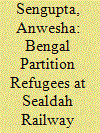

|
|
|
|
|
| Summary/Abstract |
This article focuses on the Sealdah railway station in Calcutta, West Bengal, as a site of refugee ‘settlement’ in the aftermath of British India’s partition. From 1946 to the late 1960s, the platforms of Sealdah remained crowded with Bengali Hindu refugees from East Pakistan. Some refugees stayed a few days, but many stayed for months, even years. Relying on newspaper reports, autobiographical accounts and official archives, this article elaborates how a busy railway station uniquely shaped the experiences of partition refugees. Despite severe infrastructural limitations, the railway platforms of Sealdah provided these refugee residents with certain opportunities. Many preferred to stay at Sealdah instead of moving to any government facility. However, even for the most long-term residents of Sealdah, it remained a temporary home, from where they were either shifted to government camps or themselves found accommodation in and around Calcutta. The article argues that by allowing the refugees to squat on a busy railway platform for months and years, the state recognised a unique right of these refugees, their right to wait, involving at least some agency in the process of resettling.
|
|
|
|
|
|
|
|
|
|
|
|
|
|
|
|
| 2 |
ID:
194516


|
|
|
|
|
| Summary/Abstract |
The 300,000-strong community of Indian repatriates from Burma remain torn between a place they call home and the unresolved questions of citizenship. The Indian community in Burma, whom I term the Burmese Indians, was repatriated to India following the military coup and nationalisation in 1962 and endured a considerable loss of livelihood, home, and friends. Their recreated living spaces in the Indian cities of Chennai, Visakhapatnam, Delhi, and Calcutta are by default and design prefaced with Burma; hence, ‘Burma Bazaar,’ ‘Burma Colonies,’ ‘Burma Markets,’ and ‘Burma Camps.’ This essay explores their citizenship forms, paying particular attention to civic and political citizenship, memory citizenship, and forms of belonging based on interviews with the repatriates.
|
|
|
|
|
|
|
|
|
|
|
|
|
|
|
|
| 3 |
ID:
151246
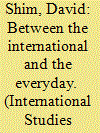

|
|
|
|
|
| Summary/Abstract |
The connection between the everyday and the international has received increasing attention in critical IR in recent years. As many contributions aim to rethink the international in terms of the everyday, the mundane and the ordinary become a site of geopolitical analysis. The paper’s central idea is that we, as academics and human beings, constantly face what can be called an international political sociology of the everyday in world politics: How is life in “distant” places? Who lives in these places? And, what are the people doing “over there”? By reflecting on how we obtain an idea of the everyday of certain places, this paper shifts its focus on representations or, more precisely, imaginations of home and the everyday for particular audiences. Precisely because the mundane can simultaneously be anything, everything, and nothing, it is important to turn to the practices and, in this vein, to the (geo)politics of mediating the everyday to us. In this regard, the paper provides an interpretive reading of two aesthetic texts—a film and a photographic essay—with the purpose of addressing imaginaries of home, the special senses, and venues of belonging wherein the everyday takes place, as particular sites of the international. In this way, the paper contributes to current efforts to decentralize current conceptions of the international.
|
|
|
|
|
|
|
|
|
|
|
|
|
|
|
|
| 4 |
ID:
166892
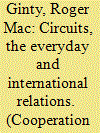

|
|
|
|
|
| Summary/Abstract |
The primary aim of this article is methodological. It proposes circuitry as an analytical device – not a mere metaphor – as a way of connecting the everyday and the hyper-local to the national, international, transnational and all levels in between. Thus, the article is concerned with international relations’ perennial levels of analysis problem. The study is prompted by empirical research from the Everyday Peace Indicators project in which research subjects narrated their own (in)security in terms of the home and the immediate vicinity of the home. The home can be regarded as a key part of everyday and ontological security for many people, but how do we connect this to the international and transnational? The article draws on the literature on engineered and biological circuits in order to propose a novel analytical device with which to emphasise the connectivity between apparently unconnected levels. A life history is used to illustrate how the analytical device might be operationalised.
|
|
|
|
|
|
|
|
|
|
|
|
|
|
|
|
| 5 |
ID:
153227
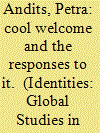

|
|
|
|
|
| Summary/Abstract |
This article examines the social aspects of Australian-Hungarians’ return to Hungary after the collapse of communism. I suggest that one of the most disillusioning aspects of homecoming for this group of Australian-Hungarians was the cold welcome they received from those who had stayed behind. The main task of this article is to analyse how returnees grappled with the negative attitudes of the stayees. Three major strategies are identified by means of which returnees facilitated their feeling of belonging: contestation, acceptance or dismissal of stayees’ perspectives. Returnees’ efforts to achieve a sense of belonging suggest that the nature of national membership is fundamentally fragile and porous and underlines that self-definitions are far from being either unconditional or ascribed. By placing contrasting narratives side by side, this article draws attention to the intersubjective elements involved in defining belonging.
|
|
|
|
|
|
|
|
|
|
|
|
|
|
|
|
| 6 |
ID:
175362
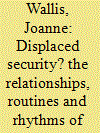

|
|
|
|
|
| Summary/Abstract |
This article considers what treating individual international interveners engaged in peacebuilding work as referent objects can tell us about emplaced security. This is important because individual interveners are diverse, embodied agents who can impact the agency, peace and security of conflict-affected populations. It argues that applying an ontological security lens can provide a partial explanation for why interveners develop narratives and perform practices, including why they sometimes identify and behave in counterproductive, and even damaging, ways. The final section considers why an analytical focus on place is valuable, noting that place-based experiences and place-identities are formative of ontological security. It argues that treating interveners as a referent object provides opportunities to rethink the tendency to focus on home as the key site of emplacement in the ontological security literature. Building on this, it argues that examining the emplaced security of interveners invites us to examine the political nature and consequences of interveners’ physical and ontological security-seeking narratives and practices, including their creation of the material and ideational structures of intervention spaces and places.
|
|
|
|
|
|
|
|
|
|
|
|
|
|
|
|
| 7 |
ID:
181339
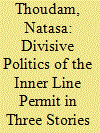

|
|
|
|
|
| Summary/Abstract |
In the context of the Citizenship (Amendment) Act, 2019, and the National Register of Citizens in Assam, this paper interrogates the xenophobic dimensions of Meitei nationalism that translated into a demand for the implementation of the Inner Line Permit (ILP) regime in Manipur in India’s Northeast. The ILP was extended to Manipur in 2019, regulating the entry of ‘outsiders’. Moreover, the recent pandemic has also visibilised the figure of a migrant worker. This paper, however, goes back several years earlier to examine literary representations of the anti-migrant ILP demand. It also highlights its gendered aspect by looking at three texts by ‘dominant’ Meitei women: Ngaseppam Nalini (Nee) Devi’s ‘Mukti’ (2002), Huirongbam Benubala’s ‘Blockade’ (2000) and Kshetrimayum Subadani’s ‘The Heat and the Agony’ (2007). Drawing on theorisations by Anne McClintock and Rosemary Marangoly George, and focussing on the figure of the migrant worker, these stories open up the question of belonging beyond the scope of the nation.
|
|
|
|
|
|
|
|
|
|
|
|
|
|
|
|
| 8 |
ID:
140101
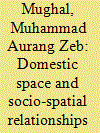

|
|
|
|
|
| Summary/Abstract |
This article explores the changing use and management of domestic space and socio-spatial relationships constructed in a Pakistani rural setting. It offers a case study which highlights the central position of domestic space as a residential and social unit in rural Pakistan. It discusses how domestic space is appropriated in multiple ways into a social unit through social practice. Given that changes in the physical structure of any place lead to negotiation of social relationships, it is shown how recent modifications in design and structure of houses are indicative of, and to some extent facilitate, social change in rural Pakistan.
|
|
|
|
|
|
|
|
|
|
|
|
|
|
|
|
| 9 |
ID:
187509
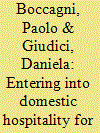

|
|
|
|
|
| Summary/Abstract |
Grassroots refugee hospitality is an innovative, if still little investigated field of practices, which illuminates and reshapes the native/immigrant divide. It also sheds light on ‘domestic humanitarianism’, as a range of everyday modes of helping that take place even in the domestic space. Drawing on a case study in Northern Italy, this article develops a framework on the societal implications of refugee hospitality, based on a multi-scalar view of home . From the inside, the lived experience of hospitality involves profound re-definitions of domesticity and meaningful personal changes for hosts and guests alike. From the outside, the connective function of local actors is crucial in shaping the lived experience of domestic reception. From the bottom up, hosting refugees is tantamount to opening, hence questioning, the most intimate threshold of the ‘national we’. Overall, and despite its limitations, domestic hospitality enables refugees to enter ‘home’ on different scales, from the micro-literal to the macro-metaphorical, thereby providing a potential counter-narrative to anti-immigrant discourses, emotions and politics.
|
|
|
|
|
|
|
|
|
|
|
|
|
|
|
|
| 10 |
ID:
145094
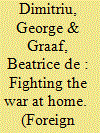

|
|
|
|
|
| Summary/Abstract |
This paper analyzes the Dutch deployment in Uruzgan between 2006 and 2010 with an eye to the challenge of garnering public support for protracted military missions abroad. The hypothesis is that public support can be shaped and sustained by strategic narratives regarding the use of force. Ringsmose and Børgesen's model on strategic narratives is discussed and tested, and expanded in two ways. First, by including the role of “counternarratives,” that is, of narratives presented by factions that oppose deployment decisions. Our data suggest that narrative dominance (the combination of narratives and counternarratives) accounts for the waxing and waning of public support for a given mission. Second, the nexus between negative narrative dominance and the ensuing drop of public consent will be teased out. Using the notion of “elite responsiveness,” we demonstrate when and how weak strategic narratives trigger a political fallout.
|
|
|
|
|
|
|
|
|
|
|
|
|
|
|
|
| 11 |
ID:
097374
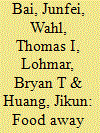

|
|
|
| 12 |
ID:
184738
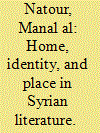

|
|
|
|
|
| Summary/Abstract |
This study explores the juncture of home, liminality and counternarrative in contemporary Syrian literature produced after the eruption of the revolution in 2011. As a case study, I examine how Maha Hassan’s Drums of Love and Ghassan Jubbaʿi’s Qahwat Al-General redefine the concept of home through heterotopic and utopic representations of the place. The study demonstrates that in both works a real sense of home proves unattainable. When the protagonists seek a place for themselves in a home that enjoys freedom and justice, the home denies them. Utilising Bakhtin’s notion of polyphony, I investigate how both works represent a multiplicity of oppressed voices in a ‘home’ that imprisons and estranges everyone. Both texts bear global messages, inviting their readers to examine the complexity of the status quo in Syria through subjecting all-encompassing representations of the revolution and resisting oppression to a process of contestation. Finally, I argue that the unattainable sense of home depicted in the novels marks such texts as a part of the enduring legacy of the Syrian revolution and its causes, and thereby they may foreground solidarity among Syrians who continue to suffer the loss of home.
|
|
|
|
|
|
|
|
|
|
|
|
|
|
|
|
| 13 |
ID:
177719
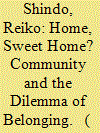

|
|
|
|
|
| Summary/Abstract |
Inspired by Kei Iwaki’s observation about migration and language discussed in her book, Farewell, My Orange (2013), this article examines migrants’ relationship to the host community’s language in parallel to their ambivalent sense of belonging. Migrants are eager to master the host community’s language and be part of the community. At the same time, they are suspicious of their own eagerness to do so. Rather than asking, ‘How can the acquisition of the local language facilitate better integration of migrants?’, the question that animates this article is: what kind of image of home is communicated by the narrative which assumes language to be a critical tool for integration? How might we start thinking about home differently if we are to address migrants’ desire to be part of the community and, at the same time, their refusal to be part of it? To investigate these questions, I will draw on Bonnie Honig’s concept of dilemmatic space. I will argue that home, which emerges in migrants’ paradoxical emotional terrain, is a place of untranslatability where foreignness remains incomprehensible.
|
|
|
|
|
|
|
|
|
|
|
|
|
|
|
|
| 14 |
ID:
138939
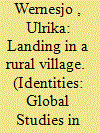

|
|
|
|
|
| Summary/Abstract |
This article explores how unaccompanied young refugees living in a rural village in Sweden make sense of home and belonging. From a post-structuralist approach, belonging and home are understood as ongoing processes that are negotiated with others, and via processes of othering and racialisation. This article demonstrates that the form of housing available, together with experiences of social exclusion in the village, may contribute to othering and thus challenge their feelings of home and belonging. However, they do construct some kinds of belonging and feelings of home based on social relationships and places that they have access to.
|
|
|
|
|
|
|
|
|
|
|
|
|
|
|
|
| 15 |
ID:
125895
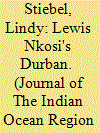

|
|
|
|
|
| Publication |
2013.
|
| Summary/Abstract |
Lewis Nkosi, the late exiled South African writer, and the city of Durban, an extended urban space of an estimated 3 million inhabitants, are incontrovertibly linked. This sprawling Indian Ocean town is where Nkosi was born, where he was educated as a small child, where he started his working career, and where he was finally buried on 10 September 2010. Given the centrality of Durban to Nkosi's life story, it is unsurprising that this city periodically appears in Nkosi's writing, both fictional and non-fictional, as a geographical 'setting' but also as a symbol of political change in South Africa. This paper, then, begins an evaluation of the role of 'Durban' and the Indian Ocean in the life and work of Nkosi, drawing from his novel Mating birds, and also from a little known article published in a Swiss newspaper, translated into German. Durban emerges from these various sources as a city in flux, a place of startling contrasts, a melting pot of peoples and a dream space called 'home' for this celebrated writer.
|
|
|
|
|
|
|
|
|
|
|
|
|
|
|
|
| 16 |
ID:
130645
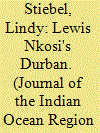

|
|
|
|
|
| Publication |
2013.
|
| Summary/Abstract |
Lewis Nkosi, the late exiled South African writer, and the city of Durban, an extended urban space of an estimated 3 million inhabitants, are incontrovertibly linked. This sprawling Indian Ocean town is where Nkosi was born, where he was educated as a small child, where he started his working career, and where he was finally buried on 10 September 2010. Given the centrality of Durban to Nkosi's life story, it is unsurprising that this city periodically appears in Nkosi's writing, both fictional and non-fictional, as a geographical 'setting' but also as a symbol of political change in South Africa. This paper, then, begins an evaluation of the role of 'Durban' and the Indian Ocean in the life and work of Nkosi, drawing from his novel Mating birds, and also from a little known article published in a Swiss newspaper, translated into German. Durban emerges from these various sources as a city in flux, a place of startling contrasts, a melting pot of peoples and a dream space called 'home' for this celebrated writer.
|
|
|
|
|
|
|
|
|
|
|
|
|
|
|
|
| 17 |
ID:
196673


|
|
|
|
|
| Summary/Abstract |
In histories of preventing and treating tuberculosis, many physicians came to prioritize the place and role of the home by the late nineteenth and early twentieth centuries. This was as true in the West as it was in the late Ottoman Empire. Also common, practices of scapegoating the poor and other marginalized populations as TB’s sources and carriers were pervasive. In this article, we examine how ideas of health, TB, and home converged to accentuate class in the ostensibly objective public health literature and propaganda of late Ottoman and early republican Turkey. Analyzing both textual and graphic narratives found in primary sources written in Ottoman Turkish, our study explores how officials – lacking resources and alternatives – opted to pursue ambitious public health propaganda campaigns to at least achieve broad educational inoculation of the population. In doing so, rudimentary matters of treatment were taught and legislated in ways that aligned with the contemporary propagation of national citizenship.
|
|
|
|
|
|
|
|
|
|
|
|
|
|
|
|
| 18 |
ID:
153226
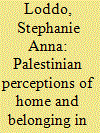

|
|
|
|
|
| Summary/Abstract |
In this article based on ethnographic research among Palestinians in Britain, I argue that applying a ‘decentred’ conception of diaspora provides an understanding of the complexity of Palestinian identity-making in Britain. After a critical review of theorizations of the notion of diaspora and its relevance to this case study, I discuss ethnographic data to illustrate how processes of rooting and mobility are linked together in various contexts in which personal migration trajectories and positionalities play an important part. I demonstrate that, for Palestinians in Britain, diaspora relates to connections constructed both in relation to their homeland and other frames of reference: in relation to both roots and mobility.
|
|
|
|
|
|
|
|
|
|
|
|
|
|
|
|
| 19 |
ID:
161094
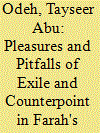

|
|
|
|
|
| Summary/Abstract |
Taking as its starting point Edward Said's appropriation of the concept of counterpoint, late style, and exile in Culture and Imperialism and On Late Style, this essay examines the thematic and literary implications of Nuruddin Farah's counterpoint and exile, as manifested in Maps. More concretely, building on Said's secular and humanist examination of counterpoint, late style, and exile as embodying a form of musical, aesthetic and sociopolitical criticism and resistance, this essay examines the way in which Nuruddin Farah addresses the aesthetic and home in Somalia as a counterpoint to the dictatorial masculine oppression of the regime from a contrapuntal and exilic perspective. The theme of postcolonial transnational feminism as a contrapuntal sign of resistance and late style is examined and interrogated in Farah's Maps in various ways. I investigate contrapuntally the way in which Somalian women, as portrayed in Farah's selected works, stand up to challenge the hegemonic patriarch and postcolonial regime in Somalia, as represented by the General Siad Barre and the oligarchy. Somalian female identity foregrounds itself in a pertinent and humanist way within a postcolonial feminist context.
|
|
|
|
|
|
|
|
|
|
|
|
|
|
|
|
| 20 |
ID:
195502


|
|
|
|
|
| Summary/Abstract |
To explore the importance of death and the dead to the study of religious conversion, this article adopts an ethnographic and comparative approach to the lives and deaths of two male Muslim converts in the southwest Indian state of Kerala. Paying attention to the treatment of their dead bodies, which were donated and cremated, contrary to their wishes for an Islamic funeral, and the problematization of their proper names, it is argued that death is the point at which selves are made/remade. Death provides the opportunity for the dead, their kin, friends, and state institutions to make claims about religious identities and familial relations. I conclude that these multiple and often contradictory stances converted the dead into religiously indeterminate figures, though their belonging to their kin was successfully established.
|
|
|
|
|
|
|
|
|
|
|
|
|
|
|
|
|
|
|
|
|